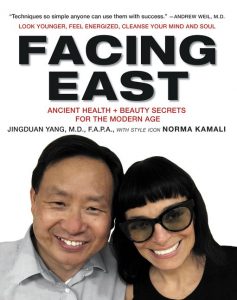Dr. Yang’s Book “Facing East”
 Ancient Health and Beauty Secrets for the Modern Age
Ancient Health and Beauty Secrets for the Modern Age
In Facing East, Dr. Jingduan Yang, a fifth-generation practitioner of Chinese medicine and a respected authority in integrative medicine, joins forces with style icon and wellness advocate Norma Kamali to reveal the ancient healing secrets, adapted for the modern age, that will help preserve, maintain, and restore vitality, health, and beauty in all its forms.
Style icon Norma Kamali, having felt deeply and noticeably rested and rejuvenated by Dr. Jingduan Yang’s unique acupuncture treatments, encouraged her remarkable physician to share his mastery of both traditional Chinese and Modern medicines with the world. The result is Facing East, a book filled with practical day-to-day health, beauty, wellness and lifestyle practices that can radically enhance the way you look, feel, and interact with everything and everyone around you!
Words from Andrew Weil on Facing East
“Facing East looks to the past for a vision of the future, drawing on ancient knowledge to devise simple strategies to allow you to stay you, vibrant and healthy.
This book by Dr. Yang, a foremost expert on Chinese medicine, and his patient, Norma Kamali, will help you to correct imbalances with techniques so simple anyone can use them with success.”
– Andrew Weil, M.D., No.1 New York Times bestselling author
Learn More About Your Your personal Energy (“qi”) Health
Yang Energy Deficiency?
- Do your hands or feet ever feel cold?
- Are your stomach/abdomen, back, lower back, or knees sensitive to the cold?
- Do you wear more clothing than other people to keep you warm because you are very sensitive to cold temperatures?
- Are you less tolerant of cold temperatures than others? (i.e. less tolerant of the winter, air-conditioning, or fans)?
- Are you prone to catching colds more than others or to retaining water in your body?
- Do you feel uncomfortable when you eat cold food or drink cold beverages? Or do you have an aversion to cold food and beverages?
- After you are exposed to the cold or have cold food or beverages, do you tend to develop diarrhea?
If you answer yes to most of the above questions, you may have a yang energy deficiency.
Are you Suffering from
Yin Energy Deficiency?
- Do you ever feel hot on your palms or on the soles of your feet?
- Do your face and body feel feverish?
- Do your skin and lips feel dry?
- Are your lips naturally redder than others’ lips?
- Are you easily constipated, or do you have dry stools?
- Is your face flushed or in reddish color?
- Do you have a dry mouth or dry eyes?
- Do you sweat easily upon mild exertion, or do you sweat at night?
If you answer yes to most of the above questions, you may have a yin energy deficiency.
Are you Suffering from
Qi (Energy) Deficiency?
- Are you easily tired?
- Do you experience shortness of breath or have difficulty catching your breath?
- Do you get heart palpitations easily?
- Do you get light-headed or dizzy when you stand up?
- Do you catch colds more often than others?
- Do you prefer being silent than talking?
- Is your voice weak when you are speaking?
- Do you sweat spontaneously or with only mild exertion?
If you answer yes to most of the above questions, you may have Qi deficiency.
Are you Suffering from
Qi (Energy) Stagnation?
- Do you feel unhappy?
- Do you easily feel nervous or anxious?
- Are you overly sentimental and emotionally fragile?
- Do you feel scared or frightened?
- Do you have congestion or pain in your breast or hypochondriac area (the region just above your abdomen)?
- Do you sigh for no apparent reason?
- Do you feel something in your throat that you cannot spit up?
If you answer yes to most of the above questions, you may have qi stagnation.